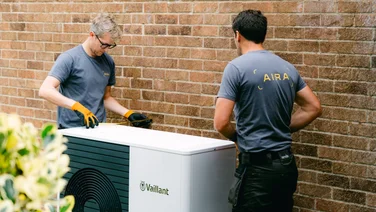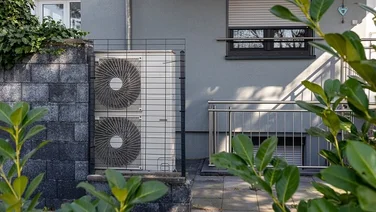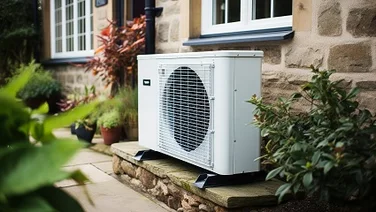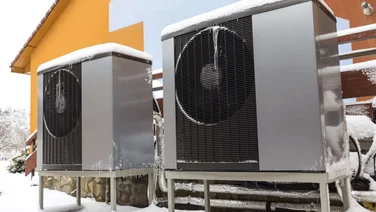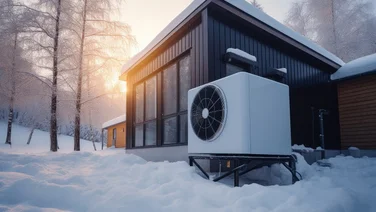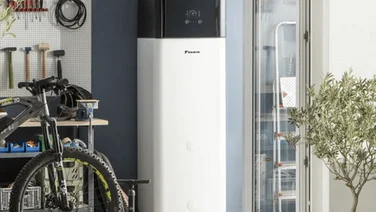We receive a small fee from trusted installers when you request a quote through our site. This helps us keep our content independent, well-researched and up to date – Learn more
- More than half of people in the UK aren’t familiar with heat pumps
- Heat pumps can bring down your carbon emissions
- The Spark Gap means electricity is more expensive than gas
In a bid to speed up the transition to greener heating, the government is combatting high heat pump prices, namely by introducing the Boiler Upgrade Scheme.
This initiative provides homeowners in England and Wales with £7,500 to help cover the cost of a new air or ground source heat pump.
However, despite this recent push for heat pumps, some buildings in the UK aren’t actually suitable for them. And heat pumps in the wrong property could actually end up costing homeowners more money on energy bills.
Worried your home will come under this bracket? Scroll down to find out which types of properties aren’t compatible with heat pumps, and which alternatives are currently on the market.
If you’re set on getting a heat pump and want to speed up the process, you can find the best prices around by using our comparison tool. Just enter your details and our trusted installers will be in touch with quotes for you to compare.
What type of central heating do you currently use?
Get started
What is a heat pump?
Are you part of the 51% of UK residents who aren’t familiar with heat pumps? Let us explain. A heat pump does what it says on the tin – it literally pumps heat into your home from the air outside, the ground, or a nearby water source.
Octopus Energy customer, Eleri, said: “I love [the heat pump’s] simplicity. It’s not complicated, and it adjusts the heating efficiently. The house also stays warmer for longer compared to our old gas system.
“It’s a great investment.”
There are two types of heat pumps – air source heat pumps and ground source heat pumps – which effectively do the same thing, but in different ways.
- Air source heat pumps take heat from the air outside and use it to warm buildings and hot water systems
- Ground source heat pumps need to be connected to underground pipes, which absorb the Earth’s geothermal energy

What is the ideal property for a heat pump?
Technically, a heat pump could be installed in most homes in the UK – but it won’t necessarily run efficiently in all of them.
‘What size heat pump do I need?‘ is one of the most common questions people ask when they begin their clean energy journey. Find out which one you need by reading our dedicated guide.
To get the most out of your heat pumps, you’ll need a property with:
- Proper insulation – The Ground Source Heat Pump Association states that although there’s no minimum Energy Performance Certificate (EPC) rating to qualify for having heat pumps, homeowners will need to show Ofgem an EPC with the “minimum standards of loft insulation and for cavity walls to be filled” in order to use the Domestic RHI grant
- Underfloor heating or large radiators – As a general rule, these will be two-and-a-half times larger than normal radiators to provide the same heat output
- Exterior space for the heat pump – A garden, patio, or spacious balcony will do
- Interior space for the hot water cylinder – A typical domestic household will have a 35 to 45-litre cylinder
What type of central heating do you currently use?
Get startedWant to get a better idea of what it’s like to own an air source heat pump? Check out our case study with Louise, from South London.
Louise had a 12-kilowatt air source heat pump installed to reduce her reliance on fossil fuels, and received £5,000 off the upfront cost through the Boiler Upgrade Scheme. Now, Louise can enjoy a warm, even temperature throughout the house, without fluctuations.
Take a look at the full interview with Louise to learn more.
Which properties aren’t suitable for a heat pump?
Although the government is pushing for heat pumps to become more commonplace – even aiming for all new heating systems installed from 2035 to be low carbon – currently, 54% of UK homes aren’t suitable for them.
Plus, our National Home Energy Survey found that only 25% of people would have a heat pump if it were free.
There are a few key property features that can make heat pumps less efficient, which we’ve listed below.
If your house comes under any of these brackets, it’s probably best to consider improving your property – if it’s feasible and affordable – as this will allow you to get a heat pump and stop relying on gas in the long run.
Read more about whether UK housing is suitable for heat pumps on our page.
Poor insulation
Properties with a low EPC rating will not be able to lock in the warmth that heat pumps create – meaning they’ll be pretty useless. And, since 59% of homes in England and Wales have a D, E, F, or G rating on their EPC, over half of the homes in these countries might not be suitable for heat pumps.
Insulation is also needed for traditional boilers, but you’re likely to feel the effects of poor insulation more with heat pumps, since they tend to produce comparatively lower heat – usually at around 35-40°C compared to a gas boiler’s average 60°C. This means they channel heat slowly, over longer periods of time.
So if your home is properly insulated, it will be able to retain heat and you’ll be able to enjoy the benefits of a cheaper renewable heating source. With poor insulation, however, you could find yourself reaching for the thermostat more, which will probably increase your bills.
Old buildings
There are plenty of pros and cons of heat pumps, but one of the main drawbacks is that they aren’t suitable for old buildings – which make up a large percentage of the UK’s housing stock.
There are a handful of reasons why older buildings might not be suitable for heat pumps. For starters, some older or listed buildings have rules and regulations on what you can and can’t change about their appearance – basically, a heat pump might not meet those set aesthetic standards.
Homeowners in listed buildings also aren’t allowed to alter the foundations of the property, which will prove problematic when trying to install the necessary pipework.
However, one way you could overcome this issue is by getting a heat pump cover, which essentially makes the outside unit much prettier whilst also protecting it against the weather.
On top of this, homes built before the 1920s typically have solid walls, which can be harder to insulate than cavity walls – and without good insulation, heat pumps just won’t work as efficiently.
Limited space outside
We won’t beat around the bush – a heat pump is a pretty hefty piece of kit, with sizes currently ranging from 6kW to 15kW. Overall, the size of the heat pump you’ll need for your home will depend on:
- Type/size of property
- Level of insulation/heat loss
- Size of radiators or underfloor heating
- Desired indoor temperature
- Seasonal outdoor temperatures in your area
Typically, both air source and ground source heat pumps are installed on the outside of an external wall, with the unit either being placed on the ground or mounted onto the wall. Either way, it’ll need a lot of room, with no obstructions, to get maximum airflow.
It’s also important to bear in mind that the installation must be at least a metre from the boundary of your property.
No underfloor heating or large radiators
Since heat pumps take longer to warm up than traditional boilers, they need to utilise a larger surface area in order to reach the same temperature level. This means that if you have heat pumps, you’ll also have an underfloor heating system or larger radiators.
So, if you have a property with limited space, heat pumps might not be a viable option for you. Of course, you can always install underfloor heating, but this can cost as much as £3,000.
High-rise buildings
This one’s circumstantial. In some cases, high-rise buildings can actually have heat pumps, but this setup can come with complications.
If there’s no space to pop a heat pump outside each property in high-rise buildings, air source heat pumps will be off the table for residents. However, if the properties have a balcony – preferably a spacious one – the outdoor unit can be mounted on a façade.
If there’s space outside the high-rise building, properties could benefit from a ground source heat pump. It can be put nearby the building, with pipes running through the properties.
But this setup can end up being pretty pricey, since a lot of work needs to be done to the whole building for it to work. Not only does the heat pump need to be installed outside, but the pipes also need to go through several stories of the building to reach different properties.
As of February 2021, there are a total of 1.31 million residents living in high-rise buildings in England – roughly 2% of the country. That’s a lot of people missing out on heat pumps.
Find out more about how heat pumps can work in highrises and flats by going to our guide to heat pumps for flats.

What are the alternatives?
Clearly, heat pumps won’t be suitable for every household. But fear not – there are other options that can help you reduce your carbon footprint at home.
Hydrogen boilers
These work in the same way that traditional boilers do, except they burn hydrogen instead of natural gas.
Hydrogen boilers burn the gas via combustion, which creates hot flue gases that can be used to heat water. This hot water can be stored for later use and pumped around your radiators to warm up your home.
Sound like a good option so far? We hate to burst your bubble, but there are two key things to bear in mind when it comes to hydrogen boilers. Firstly, hydrogen isn’t completely renewable – but it is a low-carbon alternative to fossil fuels. Secondly, hydrogen boilers aren’t actually on the market yet, which comes down to a handful of factors, including:
- There isn’t a reliable supply of 100% hydrogen gas in the UK yet
- Hydrogen boilers are still being developed – both Viessmann and Worcester Bosch have been working on their hydrogen-ready prototypes for several years now
- The UK doesn’t currently produce enough hydrogen to power everyone’s boilers
In fact, it’s thought that hydrogen boilers won’t be rolled out until 2025 or later.
District heat networks
A district heat network – also called district heating – is essentially an underground system of insulated pipes that takes heat from a central source and delivers it to a number of domestic or non-domestic buildings.
Heat sources vary between networks. There are some facilities, such as a combined heat and power plant, that provide a dedicated supply to the heat network, or provide heat recovered from industry and urban infrastructure.
Although district heat networks aren’t too popular at the moment, it’s estimated that 20% of UK heating will be served by district heat networks by 2050. And, since the annual cost of district heating is roughly 19% lower than the cost of a natural gas boiler, you might want to get on board with district heating before others start to cotton on.
Infrared heating systems
Infrared heating is fairly new to the domestic and commercial heating scene.
Instead of warming the air, like a traditional boiler, infrared heaters warm people and objects directly, which re-radiates the warmth back into the room.
The system works by emitting infrared from the heater, which then travels through the air until it hits an object. The object then absorbs the radiation, causing molecules within it to vibrate and produce heat.
Although infrared is pretty new to UK heating, you can bag yourself a wall-mounted panel for about £100–£150, or go for a larger panel for between £300 to £400 (typically mounted on the ceiling).
The panels can mount up to a hefty price tag — filling a four-bedroom home with them will cost you around £7,800.
Biomass boilers
Biomass boilers are very similar to conventional boilers, providing space heating and hot water for an entire home. Instead of using gas or oil to produce the heat, biomass heating systems burn wood pellets, chips, or logs to power central heating and hot water boilers.
Although these materials release carbon dioxide when burned, it’s considerably less than the amount released by fossil fuels.
Next steps
Heat pumps are certainly becoming more popular in the UK, thanks to the government’s Boiler Upgrade Scheme.
However, if your home isn’t suitable for heat pumps, don’t worry – there are other options out there. You can still reduce your emissions around the home by installing another green heating system.
If you’re not ready to commit to that just yet, you can always try out some energy saving tips. We have plenty of tips and tricks on how to be more eco-friendly at home – saving you money, and helping out the planet. It’s a win-win!
And if you are ready for the heat pump revolution, we can help you find the best deal. Simply pop your details into our custom-built tool, and our specialist installers will be in touch with free quotes for you to compare.


